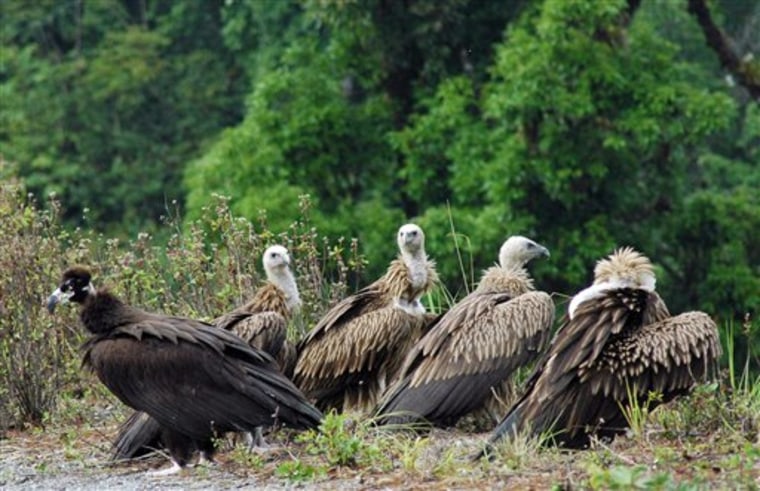It seemed like a good idea: fly a rare vulture from Thailand back to its native Mongolia. Thai Airways agreed to transport the bird and nature lovers rallied to the cause.
But fears of bird flu thwarted the flight, and the vulture was freed in northern Thailand on Thursday, thousands of miles from home. China and South Korea refused to let the bird be flown through their capitals, despite tests showing it did not have bird flu.
The cinereous vulture — nicknamed Anakin after the Star Wars character who becomes Darth Vader — was found in southeastern Thailand in December, emaciated and apparently lost. Also known as the black or monk vulture, the species is in decline in Asia because of habitat loss, shortage of food and poisoning.
Veterinarians in Bangkok nursed the bird back to health, feeding it pork legs and rotten meat. But Thursday’s release didn’t go exactly as planned.
Officials were hoping the year-old Anakin would fly off in search of food along with four Himalayan griffon vultures also rescued in Thailand.
Instead, the brown-and-white griffons took off first, leaving Anakin standing alone, stretching its wings. Chaiyan Kasorndorkbua, who oversaw the bird’s recovery, then picked it and threw it into the air, forcing it to fly toward a ridge.
“It would have been better if we could have flown it to Mongolia. But under the circumstances, this is the best we can do,” said Chaiyan.
“I was so happy to see it released in the wild,” Chaiyan said. “They belong in nature not in a cage. I’m confident it’s ready to fend for itself.”
'Need to keep on praying'
Chaiyan said he hoped the sight of the other vultures would help the young male bird search for food and navigate its way toward China or Mongolia. Anakin, with an imposing black-and-white beak, weighs about 18 pounds, and its wing span grew past 9 feet in captivity.
“We still need to keep on praying,” he said. “Hopefully, they will find the food and will fly onto China or Mongolia or any other country where they will spend the summer.”
He said Anakin was tagged with a radio transmitter to track its progress and migration routes.
Other bird experts expressed doubts that the bird would survive in an environment where there is a shortage of carcasses to feed on and where illegal poaching is widespread.
“It could get lost again,” Gawin Chutima, chairman of the Bird Conservation Society of Thailand said last month. “It’s a young bird and has no experience.”
The cinereous vulture is defined as near-threatened by the World Conservation Union in Asia, where its numbers have steadily declined because of a loss of habitat, shortage of food and increased cases of poisoning..
Though its numbers are declining in Asia, conservation efforts have boosted the population in Greece, Spain and other parts of Europe. Its global population is estimated at between 14,400 and 20,000.
Bird flu barrier
Thai Airways announced in March that it would transport the vulture to Mongolia. But months of lobbying failed to ease the bird flu concerns of China and South Korea, even though two tests deemed the vulture free of the virus.
South Korea says a government notice bans the entry of live birds from countries where bird flu as broken out. Thailand has seen four outbreaks of the H5N1 virus this year, including one last month that killed 50 ducks and chickens.
Bird flu has killed at least 172 people worldwide since it began its spread through Asian poultry in 2003, according to the World Health Organization. Most human deaths come from contact with infected birds, but experts fear it could mutate into a form that spreads easily among people.
